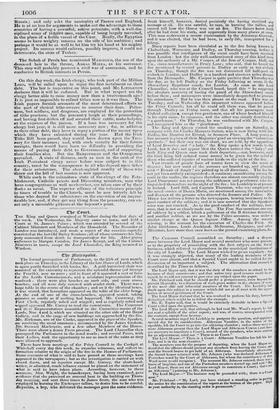On this day week, the Irish clergy, who took part
of the Million loan, will be called upon to repay the first instalment on their debt. The law is imperative on this point, and Mr. LITTLETON declares that it will be enforced. But in what respect are the clergy better able to raise money now than a twelvemonth ago? It is just as impossible to collect tithes now as it was then. The Irish papers furnish accounts of the most determined efforts on the part of clerical tithe-owners to recover their dues. Police- mien, foot soldiers, and dragoons, are employed for the protection .of tithe proctors; but the peasantry laugh at their proceedings, and having first &lien off' and secured their cattle, make holyday et the expense of the parson. If a loan was necessary for the clergy last year, it is still more necessary now ; for, in addition to their other debt, they have to repay a portion of the money upon which they have subsisted during the year. Had the Irish Tithe Bill been passed, they would have drawn upon the Trea- sury for their incomes; and, with such security for their future receipts, there would have been no difficulty in providing the means of paying their debt to Government, and of supporting their families also. But the BERESFORDS and the Orangemen prevailed. A state of distress, such as men in the rank of the Irish Protestant clergy never before were subject to in this country, must be the consequence to all who depend upon tithes for their subsistence. The short-sighted cruelty of those who threw out the bill of last session is now apparent.
While such is the calamitous state of the clergy of the Esta- blishment, Catholic priests and Dissenting ministers, men who Lave congregations as well as churches, are taken care of by their flocks as usual. The superior efficacy of the voluntary principle in times of trouble to the Church, must be now bitterly felt by those who depend for subsistence on the execution of an imprac- ticable law, and, if they get any thing from the peasantry, can ex- act only a miserable pittance at the bayonet's point.


















 Previous page
Previous page